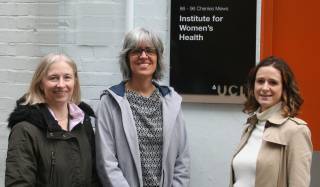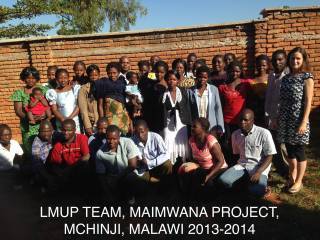International collaborations on the London Measure of Unplanned Pregnancy
The Sexual and Reproductive Health Research team in the Institute of Women’s Health is an internationally renowned centre of expertise on the measurement of pregnancy planning. Dr Geraldine Barrett, Principal Research Associate, developed the London Measure of Unplanned Pregnancy (LMUP), a psychometrically validated measure of pregnancy intention now in use worldwide (see www.lmup.org.uk for more information). Dr Jennifer Hall (Associate Professor) has extensive experience of validating, using and analysing the LMUP. Together, Dr Barrett and Dr Hall provide methodological advice and support to those wishing to evaluate and use the LMUP around the world, including Uganda, Botswana, Mexico, South Africa, Sri Lanka and Australia.
They regularly update the LMUP handbook/website and publish methodological research relating to the LMUP.
There are now 12 validated language versions in nine low and middle income countries, many of which Drs Hall and Barrett have been involved in. These include settings as diverse as Sierra Leone, Iran and Brazil. There are many other validations in progress. The LMUP is increasing recognised as overcoming many of the limitations of previous measures of unplanned pregnancy. Earlier concerns that the LMUP, which was developed in the UK, may not be applicable in low and middle income countries are now clearly unfounded.
LMUP in Malawi
Drs Hall and Barrett and Prof Stephenson have published a new paper confirming the validity of the Chichewa version of the London Measure of Unplanned Pregnancy in Malawi. Using data from Dr Hall’s PhD on over 4200 pregnant women they showed that the LMUP has excellent psychometric properties and is a valid way of measuring how planned or unplanned a pregnancy is in this rural, low income country setting.
The paper "Evaluating the Chichewa version of the London Measure of Unplanned Pregnancy in Malawi: a validation update" is available here: https://rdcu.be/cmj6k

Drs Hall and Barrett are working with Dr Borges on the translation and validation of the ‘Desire to Avoid Pregnancy’ (DAP ) scale in Brazil. Dr Borges is an Associate Professor at the University of Sao Paulo Public Health Nursing Department, Brazil. In 2019 she came to visit the team at UCL as part of a UCL-funded Global Engagement Grant with the aim of learning about each other’s work in the area of pregnancy planning and exploring possible future collaborations. Following this visit we have shared materials from Dr Hall’s ‘P3 Study’ and together we have translated the DAP and Dr Borges is now collecting data from women in Brazil. We will work together with Dr Corrine Rocca of University of California, San Francisco, who originally developed the scale, on the validation analysis.
Separately, Dr Borges led the evaluation of the London Measure of Unplanned Pregnancy (LMUP) in Brazilian Portuguese, which is the first validated version in Latin America and is the evaluation in Mozambique, Africa, which Dr Hall and Dr Barrett have advised on and a paper has been submitted for publication.
FGM
Women’s equality and empowerment is one of the UN Sustainable Development Goals. Women and girls deserve access to equal rights and opportunity, and to live without violence or discrimination. Female genital mutilation is a violation of the basic rights of women and girls. In developing countries, it is typically perpetuated without the victim’s consent or awareness of possible health implications which can include shock, haemorrhage, sepsis, sexual dysfunction and death. Bola Grace is working currently working with the research team at ABU Teaching Hospital Zaria to explore knowledge, attitudes and practices associated with FGM in Nigeria.

Caitlin Bawn is currently undertaking her PhD to develop a digital intervention to improve contraception choice, uptake and effective use in Botswana. You can read more on our Contraception page under PhD project.

Dr Jennifer Hall's, PhD on the relationships between the degree of pregnancy intention and key neonatal and maternal outcomes in the Mchinji district of Malawi was completed between 2012-15. You can read more about it on our pregnancy planning page under completed projects.
MOMI
Dr Sue Mann was part of the The Missed Opportunities in Maternal and Infant Health (MOMI) programme from between 2011-16 .
The primary objective of the study was to integrate service delivery and to strengthen health systems to improve the uptake and delivery of evidence-informed postpartum care both in the community and health facilities. Using participatory methods in each setting – Kaya district in Burkina Faso, Kwale County in Kenya (Matuga constituency), Ntchisi district in Malawi and Chiuta district in Mozambique – a package of postpartum interventions to increase demand for postpartum care and to improve delivery of postpartum care were designed and developed, tailored to the implementation gaps identified from an initial situation analysis and participatory workshops. This evaluation thus aimed to uncover how the interventions implemented resulted in increased uptake, frequency of delivery and quality of evidence based postpartum care and, in particular, what worked, for whom and within which contexts. You can read more in the final report and paper.
 Close
Close

